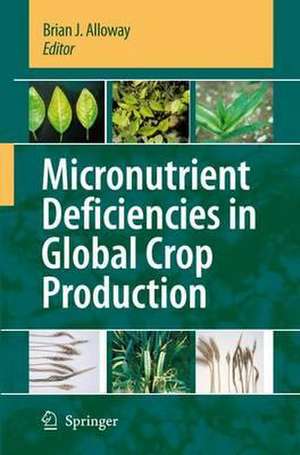Micronutrient Deficiencies in Global Crop Production
Editat de Brian J. Allowayen Limba Engleză Paperback – 19 oct 2010
Links between low contents of iodine, iron and zinc (human micronutrients) in staple grains and the incidence of human health problems are discussed, together with the ways in which the micronutrient content of food crops can beincreased and their bioavailability to humans improved. Detailed treatment of topics, such as: soil types associated with deficiencies, soil testing and plant analysis, field experiments, innovative treatments, micronutrients in the subsoil, nutrient interactions, effects of changing cropping systems, micronutrient budgets and hidden deficiencies in various chapters provides depth to the broad coverage of the book.
This book provides a valuable guide to the requirements of crops for plant micronutrients and the causes, occurrence and treatment of deficiencies. It is essential reading for many agronomy, plant nutrition and agricultural extension professionals.
| Toate formatele și edițiile | Preț | Express |
|---|---|---|
| Paperback (1) | 1194.82 lei 39-44 zile | |
| SPRINGER NETHERLANDS – 19 oct 2010 | 1194.82 lei 39-44 zile | |
| Hardback (1) | 1365.07 lei 6-8 săpt. | |
| SPRINGER NETHERLANDS – 31 ian 2008 | 1365.07 lei 6-8 săpt. |
Preț: 1194.82 lei
Preț vechi: 1572.12 lei
-24% Nou
Puncte Express: 1792
Preț estimativ în valută:
228.73€ • 235.24$ • 189.76£
228.73€ • 235.24$ • 189.76£
Carte tipărită la comandă
Livrare economică 17-22 februarie
Preluare comenzi: 021 569.72.76
Specificații
ISBN-13: 9789048177417
ISBN-10: 9048177413
Pagini: 380
Ilustrații: XXVI, 354 p.
Dimensiuni: 155 x 235 x 20 mm
Ediția:Softcover reprint of hardcover 1st ed. 2008
Editura: SPRINGER NETHERLANDS
Colecția Springer
Locul publicării:Dordrecht, Netherlands
ISBN-10: 9048177413
Pagini: 380
Ilustrații: XXVI, 354 p.
Dimensiuni: 155 x 235 x 20 mm
Ediția:Softcover reprint of hardcover 1st ed. 2008
Editura: SPRINGER NETHERLANDS
Colecția Springer
Locul publicării:Dordrecht, Netherlands
Public țintă
ResearchCuprins
Micronutrients and Crop Production: An Introduction.- Micronutrient Deficiencies in Crops and Their Global Significance.- Micronutrient Deficiencies in Australian Field Crops.- Micronutrient Deficiencies in Crops and Soils in India.- Micronutrient Deficiencies in Crop Production in China.- Micronutrient Constraints to Crop Production in the Near East.- Zinc Deficiency in Wheat in Turkey.- Micronutrient Deficiencies in Crops in Africa with Emphasis on Southern Africa.- Micronutrient Deficiency Problems in Agricultural Crops in Europe.- Micronutrient Deficiency Problems in South America.- Micronutrient Use in Agriculture in the United States of America.- Linkages Between Trace Elements in Food Crops and Human Health.
Notă biografică
Textul de pe ultima copertă
A deficiency of one or more of the eight plant micronutrients (boron, chlorine, copper, iron, manganese, molybdenum, nickel and zinc) will adversely affect both the yield and quality of crops. Micronutrient deficiencies in crops occur in many parts of the world, at various scales (from one to millions of hectares), but differences in soil conditions, climate, crop genotypes and management, result in marked variations in their occurrence. The causes, effects and alleviation of micronutrient deficiencies in crops in: Australia, India, China, Turkey, the Near East, Africa, Europe, South America and the United States of America, are covered, and these are representative of most of the different conditions under which crops are grown anywhere in the world.
Links between low contents of iodine, iron and zinc (human micronutrients) in staple grains and the incidence of human health problems are discussed, together with the ways in which the micronutrient content of food crops can be increased and their bioavailability to humans improved. Detailed treatment of topics, such as: soil types associated with deficiencies, soil testing and plant analysis, field experiments, innovative treatments, micronutrients in the subsoil, nutrient interactions, effects of changing cropping systems, micronutrient budgets and hidden deficiencies in various chapters provides depth to the broad coverage of the book.
This book provides a valuable guide to the requirements of crops for plant micronutrients and the causes, occurrence and treatment of deficiencies. It is essential reading for many agronomy, plant nutrition and agricultural extension professionals.
Links between low contents of iodine, iron and zinc (human micronutrients) in staple grains and the incidence of human health problems are discussed, together with the ways in which the micronutrient content of food crops can be increased and their bioavailability to humans improved. Detailed treatment of topics, such as: soil types associated with deficiencies, soil testing and plant analysis, field experiments, innovative treatments, micronutrients in the subsoil, nutrient interactions, effects of changing cropping systems, micronutrient budgets and hidden deficiencies in various chapters provides depth to the broad coverage of the book.
This book provides a valuable guide to the requirements of crops for plant micronutrients and the causes, occurrence and treatment of deficiencies. It is essential reading for many agronomy, plant nutrition and agricultural extension professionals.
Caracteristici
er book covers the occurrence of deficiencies in a wide range of countries and regions and their respective cropping systems in such detail Provides an up to date account of the incidence of micronutrient deficiencies in countries, regions and continents representative of most of the different conditions under which crops are grown anywhere in the world Deals with the physiological functions of boron, chlorine, copper, iron, manganese, molybdenum and zinc in higher plants and the effects that deficiencies have on these functions The links between the contents micronutrients, such as iron and zinc, in crop products and human health are discussed in detail Covers in detail, micronutrient deficiencies in the world’s major staple grains: maize, rice and wheat as well as legumes, vegetable, root, oil and tree crops Individual chapters cover numerous related topics in considerable detail, including: soil and plant analysis, field experiments, micronutrient fertilisers, trace element budgets, interactions between nutrients, effects of changes in cropping system, and hidden deficiencies







